"Homeostasis can be
defined as the tendency for intrinsic balance within
a system. Application
of a range of CES appears to enhance the Balance
of the biological central nervous system. A change
in one system within the individual will have correlative
effects upon other systems. Improvements in mood,
cognitive function, self image, shift of locus
, control to oneself, and sense of well being can
be
measured. When CES works, it enhances one's ability
to handle or deal with situations that were previously
beyond the range of one's control." |
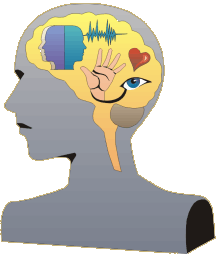
Memory loss probably affects the majority of us in one
way or another. More often than not, it is a momentary
memory lapse; nothing to worry about – it happens
to the best of us. However, when memory lapses begin
to become a regular occurrence, it is wise to dig a little
deeper and seek .
Memory can be affected by a number of factors, some
more sinister than others: it may simply be lack of sleep;
fatigue due to over-work, lack of exercise, or poor diet;
or stress-related. These are all issue about which we
can do something constructive to help us. However, memory
problems can also be the result of deeper-rooted issues
such as brain disease, tumours, or the onset of a brain
cell deteriorating disease such as Alzheimer’s.
Sufferers that have any doubts at all should always seek
medical advice with regards to continued memory lost
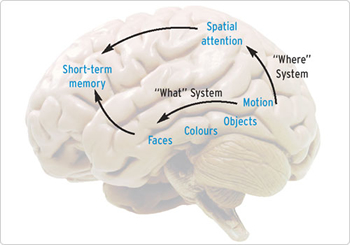
The Tenuous Past: Memory
and the Ways it Fails
Dana Bakalar
" I remember it like it was yesterday!" you say. But how well do you
really remember it? How well do you remember yesterday? Here's a quick quiz:
What time did you have lunch yesterday? What exactly did you eat? What did you
say? What did the people around you say? If you read the paper yesterday, name
all the stories you read and summarize them briefly.
Don't remember yesterday as well as you thought? Don't
worry, nobody does. Our memories are often thought of
as recording devices, mechanically noting what has happened
during the day and replaying these events like a tape.
In truth, memory is a function of the brain, which is
constantly in flux, organic, and does not behave like
a machine. Your memory can be affected in many ways by
many things, which can cause you to forget, to change
memories around, to repress memories, and even to invent
completely new ones!

How Memory Works
Doctors think memory works in three steps, first is registration, sensory
memory comes into play here, we perceive our surroundings and make our
observations ready for storage. Retention is the second component followed
by recall. If sensory memory is considered important it is rehearsed,
repeated, mulled over, and kept in STM for a time. Generally, we can
only juggle about seven facts at a time in STM. When new facts enter,
they displace the old, which are either lost or, if they have been rehearsed
enough, saved in LTM.
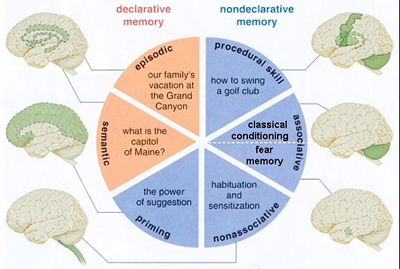
Dr. Daniel Schacter of Harvard University lists "7
Sins of Memory," ways in which our memories fail
us. His list features :
 Short-term
memory- (STM), immediate, or working memory
is the ability to remember a telephone number for the
time it takes to dial it. The item you are going to
the closet to get is stored in short-term memory until
you get there and retrieve it. You are supposed to
forget these things after a brief period, otherwise
your head would be full of trivial facts. Short-term
memory- (STM), immediate, or working memory
is the ability to remember a telephone number for the
time it takes to dial it. The item you are going to
the closet to get is stored in short-term memory until
you get there and retrieve it. You are supposed to
forget these things after a brief period, otherwise
your head would be full of trivial facts.
 Sensory
memory- also in the immediate category,
includes the ability to recognize smells, sounds,
and sights. Unless considered important, visual memory
usually lasts only half a second and sounds last
a few seconds. Sensory memory is only lost in cases
of brain injury and is usually considered as part
of the process of perception. Recent memory- is the
ability to recall day to day events and is involved
in learning new information Sensory
memory- also in the immediate category,
includes the ability to recognize smells, sounds,
and sights. Unless considered important, visual memory
usually lasts only half a second and sounds last
a few seconds. Sensory memory is only lost in cases
of brain injury and is usually considered as part
of the process of perception. Recent memory- is the
ability to recall day to day events and is involved
in learning new information
 Long
term memory- (LTM), or remote memory, concerns
itself with the more distant past, life events such
as your childhood, or your visit to Paris last fall
or the doctor last week. Long
term memory- (LTM), or remote memory, concerns
itself with the more distant past, life events such
as your childhood, or your visit to Paris last fall
or the doctor last week.
 Declarative
memory - or is often considered part of remote,
or LTM it includes semantic memory -the ability to
remember the meaning of words, facts, and a generalized
knowledge of the world and episodic memory- your autobiographical
memories. Episodic memory is often effected by amnesia. Declarative
memory - or is often considered part of remote,
or LTM it includes semantic memory -the ability to
remember the meaning of words, facts, and a generalized
knowledge of the world and episodic memory- your autobiographical
memories. Episodic memory is often effected by amnesia.
 Procedural
memory- another part of LTM consists of remembering
motor skills, knowing how to do things, such as how
to walk, ride a bike and eat. Procedural
memory- another part of LTM consists of remembering
motor skills, knowing how to do things, such as how
to walk, ride a bike and eat.
 Prospective
memory-refers to the ability to remember that
you need to do something in the future such as planning,
organizing, i.e. remembering to bring your purse with
you when going to the store. Prospective
memory-refers to the ability to remember that
you need to do something in the future such as planning,
organizing, i.e. remembering to bring your purse with
you when going to the store.
To this list, some would add " repression," the
conscious or unconscious suppression of traumatic memories.
Repression was first conceived of by Freud, who felt
that people could push memories out of their awareness
(1). This theory enjoyed new fame in the 1990's, when
hundreds of people, mostly women, 'recovered' repressed
memories of abuse, fueling a Satanic Ritual Abuse scare
during which many people were convicted of heinous crimes
they may not have committed. repression," the
conscious or unconscious suppression of traumatic memories.
Repression was first conceived of by Freud, who felt
that people could push memories out of their awareness
(1). This theory enjoyed new fame in the 1990's, when
hundreds of people, mostly women, 'recovered' repressed
memories of abuse, fueling a Satanic Ritual Abuse scare
during which many people were convicted of heinous crimes
they may not have committed.
Herpes simplex virus in humans has
long been known to prefer temporal lobe and
limbic sites; and not only are olfactory nerves
a possible route for infection, but so too
might oral cavities provide entry: "Innoculation
of murine tooth pulp with HSV selectively infected
the mandibular division of the trigeminal nerve
and caused encephalitis predominantly affecting
the temporal cortex and limbic system, a pattern
of disease similar to human HSE [herpes simplex
encephalitis]..."
Cleanse
the Blood
For years, physicians and Alzheimer's
experts have said that the earliest symptoms
of the disease typically don't appear until
you're in your 60s, 70s, or beyond. But now
there's reason to believe that the first
warning signs may actually crop up much earlier
than that, and in a seemingly much more benign
way: as cold sores, those embarrassing blisters
that can erupt on the lips of people who
are sick or run-down,
,Source
Attack
Herpes Now |
Besides the more everyday ways memory fails,
there are many diseases which can affect it. Alzheimer's
is probably the most well-known of these. Alzheimer's
impairs judgment and changes personality as well as affecting
memory .. It occurs most often in older people, who make
up about 50% of the population with the disease, and
is very rare in individuals under 40 .. The memory loss
in this disease, as well as in other brain-altering diseases,
comes form changes in the physical structure of the brain,
rather than from normal brain mechanisms.
"Beth was given anesthesia
when she gave birth to her first baby and later
found that she had lost part of her memory.
She was forced to give up her job in an aerospace
plant. Years later a friend gave her a small
cranial electro-stimulation (CES) device and
she began using it.
‘Almost overnight,’ she
said, ‘all my memories started coming
back, including everyone’s telephone
extensions at the plant. It was uncanny – all
those old extension numbers of people I hadn’t
thought of in years.’
"This story, told to me by researcher
Bob Beck, Ph.D., provides graphic evidence
of a key fact: We have electrically-powered
brains. Each of the billions of neurons in
our brains is a tiny electrical generator,
as complex as a small computer, firing an electrical
signal that triggers the release of various
neurochemicals and links it with thousands
of other neurons."
Mega Brain Power, Michael
Hutchinson, 1994 |
Memory - What is it? Webster's defines
memory as "The mental capacity or faculty of retaining
or recalling facts, events, impressions or previous experiences." Scientists
still do not understand how memory works witnessed by
the numerous confusing categories and terms, they usually
divide it into three types -immediate, recent and remote-
based on time. Children and young adults are often proud
of their memories while as adults we generally complain
about ours. Achievement in school and the work place
is largely dependent on the ability to memorize facts
and social success is tied to the ability to remember
names and faces. When we reach our forties things change.
Did you ever find yourself looking in the closet but
not knowing what you are looking for only to remember
what it was when you got back to the kitchen? This is
a normal consequence of aging and usually only effects
short-term memory.
Alzheimer's and
Autism are linked?
There are 7 different types!
Herpes simplex type 1 (HSV-1) and type 2
(HSV-2) causes cold sores and genital herpes.
Many experts suspect HSV-1 may be involved
in Bell’s palsy and some other neurological
disorders. Herpes zoster is responsible for
chickenpox and shingles. Cytomegalovirus, another
member of the herpes family, can cause some
cardiovascular diseases and eye disorders,
and is particularly dangerous to developing
fetuses, newborns, and people with depressed
immune systems. The Epstien-Barr virus (EBV)
is the virus that causes infectious mononucleosis.
Human herpes virus type 6 (HHV-6) and 7 (HHV-7)
are suspected of triggering autoimmune disorders,
including multiple sclerosis, and roseola,
a common illness of early childhood. Human
herpes virus type 8 (HHV-8) is very closely
related to the Epstien-Barr virus, and may
lead to cancer of the bone, chronic fatigue
syndrome, Kaposi’s sarcoma, and infection
of the lymphatic system.
more
Attack
Herpes Now |
The good news is -
we do become more intelligent and wise as we do age.
Wisdom is demonstrated by our increased ability to make
associations or links between past experiences and new.
This function becomes easier as we accumulate more experiences
with time. Does our memory fail or does it just slow
and require more maintenance? This is controversial subject
in medicine. Remember that all of the statements made
concerning memory loss are based on studies that measure
averages of groups of people not individuals. We all
know of an 80+ year old who is as sharp witty and intelligent
as ever.
"It's all about stimulation and evolution
of the mind. Most of us carry too much fear from
our childhood, then get lost in coping with the
stress of adult life. Some people have the ability
to easily take on new experiences and thus pushing
the brain to further growth and expansion. Life
is intrinsically evolutionary and we are made to
evolve and explore our world."
Unknown |
The brain shrinks as we age, some of the
shrinkage is due to cells dying, but cell death is less
of a factor then previously thought. Cell death begins
as early as 40 but measurable intellectual slowing does
not begin until age 60 and does not accelerate until
age 80. Other cells take over the dying cell function
and cell death alone does not significantly effect memory.
The neuro transmitter acetylcholine decreases over time
and may contribute to age associated memory impairment
"Many studies have shown that
low-level electrical stimulation actually promotes
cell growth and regeneration. A recent NIH study
showed that low-level electrical stimulation
of neurons increased the production of the all
important myelin cells in the brain. This could
be an important discovery since myelin is shown
to be decreased in patients with certain disorders
and diseases, including bipolar disorder, schizophrenia,
and multiple sclerosis."
|
How often
have you asked yourself the question:
" Why can't I remember everything I read?"
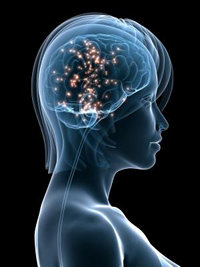
The problem with poor memory is not confined to reading.
It is more generalized in that we also have difficulty
remembering:
 names
of people names
of people
 dates
and times dates
and times
 telephone
numbers telephone
numbers
 codes,
passwords codes,
passwords
 events
and occasions events
and occasions
 business
facts and figures business
facts and figures
 jokes jokes
 etc,
etc. etc,
etc.
| "Double-blind studies were done at the
University of Wisconsin on the Brain Tuners’s
capabilities to overcome drug-withdrawal symptoms
and it did the job. Studies at both Wisconsin and
the University of Louisiana showed it could boost
IQ from twenty to thirty points. Brain Tuners stimulation
appears to enhance neural efficiency," researchers
stated.
'Users report the Brain Tuners reduces stress,
improves short and long term memory, helps
learning, increases energy, improves concentration
and reduces pain, anxiety, depression, and
sleep requirements."
|
It is not ONLY remembering what you have
now read, but remembering what you read yesterday, last
week, a month ago, a year ago, and so on.

The problem is not because you are running out of brain
storage space. Even when we reach old age, we still have
plenty of unused brain capacity available.
| “Only one who devotes himself to a cause
with his whole strength and soul can be a true master.
For this reason mastery demands all of a person.” -
Albert Einstein |
The problem is not TIME. Information simply
cannot "leak" out of our ears over time. Why
can we remember vivid details of childhood yet the details
of last week's newspaper are vague? We remember perfect
details of scenes that only happened once, yet information
drummed into the brain just simply will not "stick".
Reference to Dr. Meg Patterson: "Scottish
surgeon Margaret Patterson studied Wen’s
methods in Hong Kong. Back in England she developed
highly sophisticated machines that produced neurotransmitters
by electrostimulation of the brain. Then she
set up her own treatment center in California.
Famous clients were flown in, some on stretchers – rock
superstar Peter Townshend for one, guitarist
and composer for The Who and creator of the hit
rock musical Tommy. A drug addict for years,
Townshend had spent a fortune trying to kick
his habit. Within forty minutes of applying the
device, the heroin was counteracted. Ten days
of treatments later he was over his addiction
to heroin, alchohol, and cocaine, with no withdrawal
symptoms."
OMNI Magazine, Volume 5,
Number 4, January 1983 an Article was written
by Kathleen McAuliffe, "The Black
Box: Secret Drug Treatment of Rock Superstars" described
how a "Brain Tuner" black box
was used by Dr. Margaret A. Patterson,
MD., to cure British rock star Pete Townsend
of "The Who" of his addiction
to heroin. |
Cranial electrical stimulation may be a very useful
alternative to drug treatments in individuals that have
treatment resistant anxiety and/or depression. Furthermore,
CES used in combination with the natural amino acids
may convert the amino acids more rapidly to neurotransmitters
resulting in greater effectiveness.
Eric Braverman, M.D.
21st Century Medicine & Learning
This response submitted by Ronald B. Keys, JD, PhD .
Slow learners and, or, those with impaired nervous
system development may have their brains and nervous
system jump started. Little did we know back in the 1950s
when the movie, Forbidden Planet, with Leslie Nielson,
Ann Francis and Walter Pidgeon, that the technology to
stimulate brain growth, with a form of cranial electrical
stimulation, might be in use in the 21st century.
"Cranial Electrotherapy Stimulation
(CES) is the application of low-level pulsed
electrical currents (usually less than 1 milliampere)
applied to the head for medical and/or psychological
purposes. There is now better than 20 years of
medical experience with CES in America. Presently,
its use requires a prescription by a licensed
health practitioner in the United States. It
is available without a prescription throughout
the rest of the world."
|
So, what
other Perhaps is the cause of the memory problem?
Every computer's hard drive is organized. The aim of
loading information onto the hard drive is not to leave
it there, untouched and inaccessible, but to use it.
Much thought was put into how the information will be
filed away so that when it is needed it can be accessed
quickly and easily. Your computer has a filing system
to access all information placed in any possible location.
The key to enhancing human memory is very similar to
the thinking behind a hard drive's storage and retrieval
system. To now, you have been uploading your information
to your brain without an organized system. Getting the
information in is no problem; it’s the retrieval
process that needs polishing.
For young men like Rich
P., who wonders what's in store for him in
the decades ahead, this would
appear to be an enormous scientific misstep — particularly
since Rich believes he's seen firsthand the
link between herpes and Alzheimer's.
His girlfriend's father, the one who passed
away from Alzheimer's? He battled cold sores
all his life..Source
More |
Cranial electrical
stimulation (CES) may improve memory,
attention and focus; important studies are emerging
on the uses of mild electrical current to enhance
cognition and aspects of intelligence.
RESEARCH
PAPERS
Think of the cells in your body as being a bit like
a dry cell battery in your car. When the battery is fully
charged, the car starts and everything works fine. When
the car battery is discharged or flat, sometimes all
its needs is a “jump start”, a small amount
of electricity, and everything is fine again.
82% of participants in one study suffering from
an anxiety disorder reported a significant improvement
in their symptoms after treatment with CES.
- Kirsch D, Gilula MF, Electromedicine: CES in the Treatment of Anxiety
Disorders, Practical Pain Management, March 2007, pp 40-47. |
Sick cells are merely like discharged cells:
This may be an oversimplification, but is the best way
to explain the technology of MicroCurrent Therapy in
lay person terms.
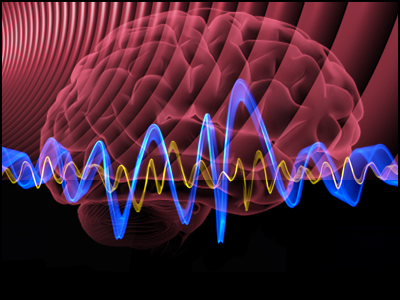
Scientists have found that different microcurrent frequencies
have different effects meaning this revolutionary medicine
contains infinite applications and possibilities, especially
in the areas of healthy new cell renewal and stimulation.
The applications of MicroCurrent Therapy appear to be
endless!
| "In the 1960’s Robert O. Becker
(1985) demonstrated that electrical current is
the trigger that stimulates healing, growth, and
regeneration in all living organisms. He found
that repair of injury occurs in response to signals
that come from an electrical control system, and
suggested that this system became less efficient
as we age. " |
It is also believed that micro-current
stimulation restores cellular electrical balance by changing
potentials across cell membranes. This may alter the
levels of certain ions and molecules toward a desirable
equilibrium. Other physiological effects are believed
to be produced: reduction of alkalinity proximate the
passage of electrical current and the production of low
levels of hydrochloric acid which can scavenge free radicals;
attraction of oxygen to the region; localized vasoconstriction
and vasodialation; reduction of local hemorrhage; sedation;
increased tonicity of local tissues; antisepsis; production
of desirable fibroplasia; and reduced neuromuscular irritability
So, it is believed that, if electrical stimulation is
provided to the cells before they die, blood vessel permeability
is increased, a more normal cellular electrical potential
will be achieved, the ATP levels will increase, and protein
synthesis will occur again.
"Adenosine triphosphate is an essential
factor in the healing process. Large amounts of
ATP, the cell’s main energy source, are
required to control primary functions such
as the movement
of vital minerals, like sodium, potassium,
magnesium and calcium, into and out of the
cell. It also
sustains the movement of waste products out
of the cell. Injured tissues are deficient
in ATP.
As MET restores circulation and replenishes
ATP, nutrients can again flow into injured
cells and
waste products can flow out. This is necessary
for the development of healthy tissues. As
ATP provides the energy tissues require for
building
new proteins, it also increases protein synthesis
and membrane transport of ions. "
|
This has important implications also for increased nerve
conduction. By increasing the flicker fusion resolution
and refresh rates Micro-current therapy increases signal
strength to the brain.
Chapter Reprint: Don’t Go Blind!
Patient guide for treating Macular Degeneration and
Retinitis Pigmentosa and other chronic eye diseases
using Micro-Current Stimulation Therapy by Thomas W
Harold, Dr. Darrell DeMello, MD and Dr. Larry B. Wallace,
OD, FCSO
A 386% increase in attention span test results
after just 20 minutes of a single CES treatment
in healthy volunteers - Southworth S, A Study of
the Effects of Cranial Electrical Stimulation on
Attention and Concentration, Integrative Physiological
and Behavioral Science, 1999, Vol 34:1, 43-53. |
To date, several thousand Americans are
treated with CES annually and more than eleven thousand
persons own CES devices, which have been prescribed for
their home use. Possibly the most exciting application
of the CES is for drug addiction. Further studies are
needed to fully document use of the device for these
purposes. In this technological age when we are surrounded
by electromagnetic fields and currents, CES treatment
may be necessary as an antidote and for maintenance of
fully optimum health. Electromagnetic “ pollution” from
video screens, televisions, stereophonic equipment, microwaves
and phone lines may be destroying our health and may
require a device of this type to counter these negative
effects.CES may provide natural levels of supplementary
current to keep the brain healthy in the electrical age.
Eric
Braverman, M.D
"MicroCurrent Therapy is
a form of electric medicine used to naturally and
safely stimulate cell
growth, renewal and healing. It uses extremely
low amounts of electricity measured in millionths
of
an Amp that most people can hardly feel. " |
Introducing
Our latest CES unit
|
Its
An Alpha theta Stim and a BT11
all in one
5 Built in frequencies
 0.5
Hz 0.5
Hz
 1.5
Hz 1.5
Hz
 5.0
Hz 5.0
Hz
 7.83
Hz 7.83
Hz
 10
Hz 10
Hz
 100.00
Hz 100.00
Hz
 Plus
the Full BT6-BT11 Beck Protocol Plus
the Full BT6-BT11 Beck Protocol  1000.00
Hz + 111.00 Hz 1000.00
Hz + 111.00 Hz
|
Fully Rechargable Batteries
Timer
Intensity Control
Very portable
High Quality Earclips
|
|
|

